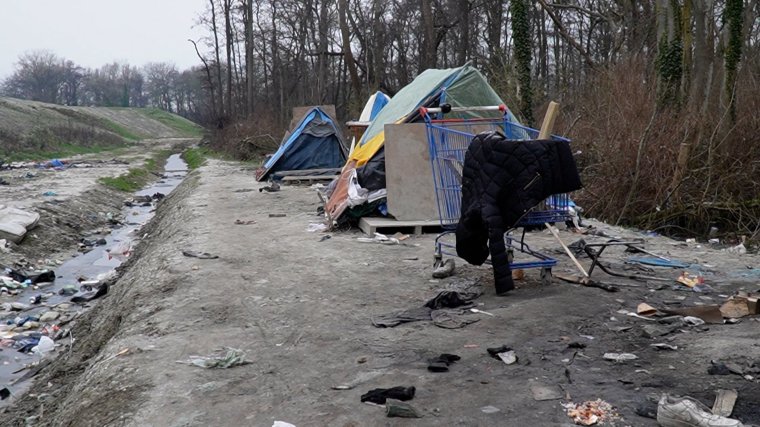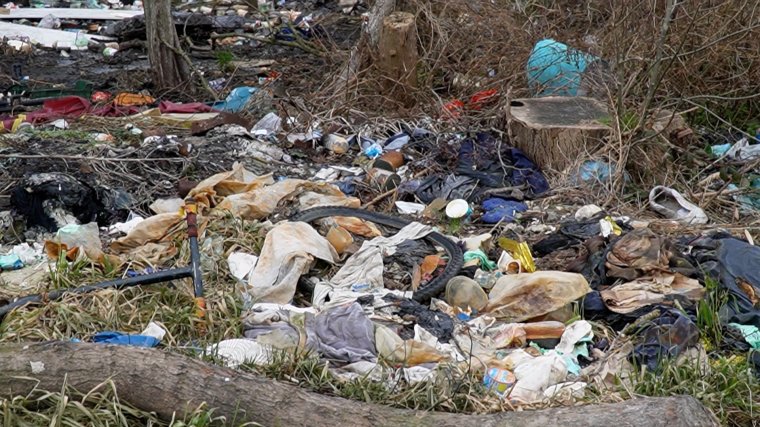A huddle of Sudanese teenagers stand shivering over a small fire in a vast patch of woodland in Calais, northern France. With little wood to sustain their fire, they toss bits of plastic and even squeeze hand sanitiser onto the flames. A plume of toxic smoke rises into the air, which makes them cough. It is -3°C.
These teenagers, who fled war in their home country of Sudan, have lived like this for months in the makeshift migrant camps, which are cleared by police every two days.
The surrounding ponds and bogs have frozen, as has the mud underfoot. i learns from aid workers and medics that some of the 1,800 people living in the camps have developed trench foot through sleeping in their shoes during the cold and wet winter.
“Some of us have been here for four months,” the Sudanese teenagers tell i. “We want to get to the UK. It’s my dream,” one says.
They sleep in shelters made of blue tarpaulin and erected in a circle around the fire. They sit on stools, rocks or even old car seats. Stray cats roam the camps.
The teenagers want to reach the UK but have run out of money, so cannot pay people smugglers to get across the Channel in a small boat. Instead, they have tried to jump in the back of lorries headed for Britain but were caught due to heightened surveillance.

The 1,800 migrants living in these makeshift camps in northern France, in both Dunkirk and Calais, are waiting to try to reach the UK after months – or even years – of travelling.
As well as some developing trench foot, cases of scabies are also rife, according to a first aid team working in the area.
Most living in the Calais camp are Sudanese, while 40 minutes drive up the coast in Dunkirk, people are predominantly Iraqi Kurds and Afghans. The overwhelming majority in the camps are men and boys. Women and children are in Calais but are eligible for local accommodation sites.
The people i meets say they feel they have no other choice; returning home is not an option, many don’t have passports to travel by other routes, and there is no visa to seek asylum in the UK.

Tens of thousands of people claim asylum in France, and it is possible for these teenagers to submit asylum claims there.
But some said they did not want to stay in the country because they did not speak the language, while others said the experience of life in Calais’ camps had made them want to leave France.
The UK Government operates a series of UN-led refugee resettlement schemes but it is not possible to apply for these, as individuals are selected by the UN.

Almost all have already tried to cross the Channel more than once. Some were caught by French police and others were prevented by bad weather. One man, from Afghanistan, counts his attempts on his fingers; eight in the last three months.
This winter has seen a drop in Channel crossings, with no successful attempts over Christmas for the first time since records began five years ago. In 2023, the number of Channel arrivals dropped by more than a third on 2022’s record figure of more than 45,000.
The Government claims this is evidence that its hard line border policies are working, with deterrents having an impact and UK-funded French police stopping departures.

But several asylum seekers told i that nothing would deter them from crossing.
Two Sudanese men who have already tried to cross, six times between them, said the Government’s flagship migration policy – the Rwanda scheme, which would see small boat arrivals sent to Rwanda to have their asylum claims processed – would not put them off. They suggested it may never come to fruition or be scrapped following the next election.
During i‘s visit, MPs voted to pass a Government bill declaring Rwanda a safe country for asylum seekers, paving the way for flights to begin once the legislation passes through the House of Lords.

“Until now, no one has been taken to Rwanda … I’ll go to the UK whatever it takes,” 30-year-old Jamal* said.
Aid workers argue that it is poor weather, rather than Government policy, that has meant those attempting to cross have not reached the UK.
Further into the camp, the woodland parts to reveal a large clearing. The trees have been felled by French police in a bid to stop migrants living among them. Another group of people are sitting around a fire, burning jerrycans that they had used to collect water and surrounded by plywood shelters.

Police clear the sites every 48 hours, removing possessions and empty tents, before the migrants rebuild them. These shelters were rebuilt only last night.
Litter is scattered all around and blankets, which were laid down to soak up the mud during recent flooding, are now frozen into the ground.
“We all want to go to the UK because of the war,” one, also from Sudan, says.

But why the UK? “Sudan was colonised by the UK, so we speak the same language and have the same culture,” he replies.
The UK is safe, they say, and their experience with the Calais police seizing belongings and slashing the rubber boats when the migrants attempt to set off on the shore has made them want to leave France.
Each day they walk to a distribution site, where local groups including British charity Care4Calais hand out food, hot drinks and clothes. One charity runs periodic minibuses to a shower block, others offer charging points so the migrants can call home or read the news in the UK.
The aid workers also provide a football, sewing materials to mend clothes and shoes, and clippers for the men to cut their hair. Others study English on a handful of textbooks and a battered whiteboard.
They hope their stay in these makeshift camps will only be brief – but many have left before only to come back.
“It’s very rare that people get through on lorries,” says aid worker Ella. “They just get chucked out and return back. So people just carry on and carry on and carry on, and that’s why increasingly you see people stuck here for years even – and that will be the case for these boys.”


